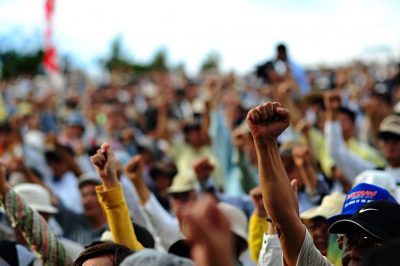A Strategy for Global Democracy and Wealth Sharing

It is time for power to the people!
Global capitalist inequality contributes directly to health pandemics, environmental degradation, and mass poverty. Elite-corporate oligarchs control the governments and political parties. They use established militarized police states to protect their vast empires of property and money worldwide. The global one percent own half of the world’s wealth, and the richest 10 percent control 81 percent of all wealth. Only 200 elite people in a handful of companies make the investment decisions for over $50 trillion of capital.
Concentrated wealth is violence towards the 80 percent of the people in the world living on less than ten dollars a day, with a majority of those surviving on just a few dollars. Over 30,000 people die daily from the violence of empire. Mass malnutrition, homelessness, imprisonment, insecurity are the manifestations of concentrated global capital.
A racist police murder has triggered a national revolt. Massive, mostly peaceful protests have resulted, expressing outrage against continued killings of people of color. The circumstances of this outrage are amplified by the forty million newly unemployed in the US, and the friends and families of the 100,000 plus virus victims.
The people protesting in the streets lack any real form of democratic power other than the ability to destroy property and disrupt daily commerce. When property damage, fires, and lootings occur there has been widespread condemnation of these behaviors by politicians, and corporate media opinion writers. Accordingly, we know that agents of the national security state will foment property damage to use as a justification for expanded repression and increased militarism.
For many middle-class folks the looting of property is considered morally wrong. They worry about losing their own modest assets in widespread civil unrest and are quick to say they oppose racism but deplore violence. However, many would likely applaud democratic governmental appropriations of 90 percent of Jeffrey Bezos’ $151.6 billion, Bill Gates’ $102 billion and other elite billionaires if the money were to be used for the permanent elimination of hunger and basic human needs in the world. The real moral obligation for us all is the reallocation of world resources for all humankind to have their essential needs covered. Electoral politics, spontaneous marches, and general strikes will likely not result in the transfer of wealth from the 1 percent to the rest. We need an easily adoptable strategy of resistance.
Capital violence happens every day worldwide, and US racism is a major aspect of that violence. We must ask ourselves– Is the widespread revolt against police racism in the US today the possible beginning of a broader social democracy movement to openly address the inequality of concentrated wealth? Could a widespread revolt become a human rights revolution? Can we build a grassroots democratic movement that seeks to bring about a greater sharing of the world resources controlled by the 1 percent?
A democratic movement, with activists following the moral guidelines from the Universal Declaration of Human Rights and holding a united strategy, could well pressure elites into a greater sharing of their wealth without the turning to violent fascist repression. Here is how that could work.
A grassroots democracy movement could engage in targeted property restrictions and disruptions of commerce within the global elites themselves and their businesses. This type of property disruption is morally justified as a strategy for broader change. We all know the names of and have access to the transnational corporate properties benefiting from the continued violence of inequality, racism, and militarism worldwide. Were democracy movement protests to make these properties commercially unusable there would be rapid adjustments sought by the elite oligarchs. Some elites would call for greater repression and others would be open to economic sharing. The key for movement activists would be to maintain disruptive pressures on targeted transnational concerns through boycotts, sit-ins and blockades, and to carefully avoid violence towards the police and the elites themselves.
A strategy of commerce disruption that focuses on transnational business and elite oligarchs could be adopted by peaceful human rights movements with very positive effects for human inequality. These actions should strategically avoid the disruption of locally-owned businesses, family commerce, and working peoples’ livelihoods whenever possible.
We should try to transform current and future protests from random street disruptions to the specific targeting of businesses controlled by the global power elites. Elite responses will likely be strained, some will demand martial law, but many in the Davos crowd already recognize that the current economy is unsustainable. We should pressure them to mediate wealth sharing among the global elites and suspend the tendency towards repressive fascism. There is hope for a better world and we can pressure elites through moral collective actions to help achieve that goal.
*
Note to readers: please click the share buttons above or below. Forward this article to your email lists. Crosspost on your blog site, internet forums. etc.
This article was originally published on Project Censored.
Prof. Peter Phillips is a Political Sociologist at Sonoma State University; author Giants: The Global Power Elite, (New York: Seven Stories Press, 2018); past director of Project Censored; co-author/editor of fourteen Censored yearbooks, 1997 to 2011; co-author of Impeach the President, (New York: Seven Stories Press, 2007); and winner of the Dallas Smythe Award from the Union for Democratic Communications. Peter Phillips is a Research Associate of the Centre for Research on Globalization (CRG).
Featured image is from Project Censored

